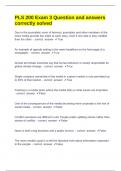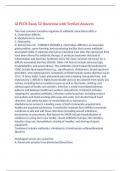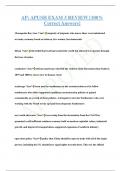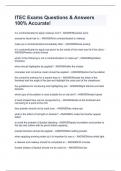Artikel Burgess-Proctor
Gendered pathways combines life-course insights about the role of social bonds in shaping
trajectories of offending and desistence with feminist insights about how gender moderates
these processes. This model is used to situate women’s offending in the context of their prior
victimization experiences, as well as to examine life-course processes such as offending and
desistence more generally using a gendered lens.
There is evidence that the consequences of parental incarceration vary by both parent and
offspring sex. Parental incarceration – especially maternal incarceration – increases risk of
offending and incarceration among adult offspring. It is also linked to a cascade of negative
outcomes for children including: poorer educational attainment, increased risk of antisocial
behavior, physical aggression, internalizing problems such as depression and anxiety, and
increased likelihood of homelessness. It does not only affect children but the entire family
unit by stressing alternative caregivers and compromising the family’s financial stability.
However, there is disagreement about whether these detrimental outcomes are the result of
parental incarceration itself, or due to preexisting characteristics of the individual, family
and/or community that are associated with increased risk of parental incarceration.
Children of incarcerated mothers are 2,5 times more like than children of incarcerated fathers
to themselves be incarcerated as adults. And maternal but not paternal incarceration is linked
to the likelihood of youth rearrest among offspring. Other research however found detrimental
outcomes only among children of mothers with a low propensity to be incarcerated. For
children whose mothers have a greater likelihood of being incarcerated, the effects are limited
or non-existent. Of course, it is possible that a focus on average effect elides heterogeneity
across groups – that is, that contemporaneous positive and negative effects wash out to yield
null effects.
Little research has been done on differential effects for daughters and sons of parental
incarceration. Fathers incarceration was found to increase physical aggression in sons but not
daughters and sons also show more behavioral problems. A possible explanation for the lack
of knowledge may be that studies examining outcomes that are more typical among boys –
like delinquency – may miss the effect of parental incarceration on girls, who are less likely to
exhibit such behaviors in the first place.
Why would parental incarceration be detrimental? From a strain perspective, parental
incarceration alters family composition and can cause significant resource deprivation for
families. Children of incarcerated parents can suffer financially due to the loss of parental
, income and/or provision of child support, as well as other social service benefits.
Incarceration also compromises opportunities for effective attachment between parents and
children. Children benefit from close relational ties even with criminally involved parents,
whose incarceration-related absence can be traumatic. Correctional facilities maintain strict
visiting regulations and typically are located far from family, making it difficult and
expensive for incarcerated parents to maintain contact with their families. Incarceration of a
parent can produce a harmful stigma that does not occur in parental absence due to divorce,
abandonment or death.
A gendered pathways theoretical framework enables consideration of the ways in which these
three mechanisms (Strain, attachment and stigma) operate in a gendered context throughout
the life course. For example, whereas fathers incarceration places particular strain on the
family’s financial circumstances, mothers incarceration may be most acutely felt within
family social networks, yielding familial strain for their children – particularly those living in
disadvantages neighborhoods. Parental incarceration also can lead to changes in guardianship
and increased residential instability which have been linked to CJS involvement, especially
with maternal incarceration. Incarcerated women are more likely to be the primary caregiver
of their children greater risk of out-of-home placement for children. Coupled with public
perceptions of criminal women as bad mothers, the infrequency of women’s incarceration
relative to men’s might result in more stigmatic and less supportive responses from friends
and family. A gendered pathways perspective recognizes that women’s offending trajectories
often are precipitated by victimization experiences such as physical and sexual abuse, neglect
and traumatic childhood experiences.
Parental incarceration significantly increases the odds of adult CJS involvement for offspring,
even when controlled for other factors related to adult offending. Overall, the effect of
parental incarceration is more pronounced for the same-sex parent. The only exception to this
pattern is in incarceration of offspring, where maternal incarceration has a stronger effect than
paternal incarceration for adult daughters and sons alike. The effects for arrest and conviction
were stronger with mother-daughter than father-son, the daughters were more likely to be
arrested and convicted, and nearly as likely to be incarcerated.
It is possible that this is a product of disrupted attachment. Or perhaps the loss of a same-sex
parents imparts unique emotional or familial strain, or is especially stigmatizing. It seems
clear that maternal incarceration plays a particularly powerful role in initiating offending
trajectories that lead to CJS involvement among daughters. Perhaps loss of a mother to
Gendered pathways combines life-course insights about the role of social bonds in shaping
trajectories of offending and desistence with feminist insights about how gender moderates
these processes. This model is used to situate women’s offending in the context of their prior
victimization experiences, as well as to examine life-course processes such as offending and
desistence more generally using a gendered lens.
There is evidence that the consequences of parental incarceration vary by both parent and
offspring sex. Parental incarceration – especially maternal incarceration – increases risk of
offending and incarceration among adult offspring. It is also linked to a cascade of negative
outcomes for children including: poorer educational attainment, increased risk of antisocial
behavior, physical aggression, internalizing problems such as depression and anxiety, and
increased likelihood of homelessness. It does not only affect children but the entire family
unit by stressing alternative caregivers and compromising the family’s financial stability.
However, there is disagreement about whether these detrimental outcomes are the result of
parental incarceration itself, or due to preexisting characteristics of the individual, family
and/or community that are associated with increased risk of parental incarceration.
Children of incarcerated mothers are 2,5 times more like than children of incarcerated fathers
to themselves be incarcerated as adults. And maternal but not paternal incarceration is linked
to the likelihood of youth rearrest among offspring. Other research however found detrimental
outcomes only among children of mothers with a low propensity to be incarcerated. For
children whose mothers have a greater likelihood of being incarcerated, the effects are limited
or non-existent. Of course, it is possible that a focus on average effect elides heterogeneity
across groups – that is, that contemporaneous positive and negative effects wash out to yield
null effects.
Little research has been done on differential effects for daughters and sons of parental
incarceration. Fathers incarceration was found to increase physical aggression in sons but not
daughters and sons also show more behavioral problems. A possible explanation for the lack
of knowledge may be that studies examining outcomes that are more typical among boys –
like delinquency – may miss the effect of parental incarceration on girls, who are less likely to
exhibit such behaviors in the first place.
Why would parental incarceration be detrimental? From a strain perspective, parental
incarceration alters family composition and can cause significant resource deprivation for
families. Children of incarcerated parents can suffer financially due to the loss of parental
, income and/or provision of child support, as well as other social service benefits.
Incarceration also compromises opportunities for effective attachment between parents and
children. Children benefit from close relational ties even with criminally involved parents,
whose incarceration-related absence can be traumatic. Correctional facilities maintain strict
visiting regulations and typically are located far from family, making it difficult and
expensive for incarcerated parents to maintain contact with their families. Incarceration of a
parent can produce a harmful stigma that does not occur in parental absence due to divorce,
abandonment or death.
A gendered pathways theoretical framework enables consideration of the ways in which these
three mechanisms (Strain, attachment and stigma) operate in a gendered context throughout
the life course. For example, whereas fathers incarceration places particular strain on the
family’s financial circumstances, mothers incarceration may be most acutely felt within
family social networks, yielding familial strain for their children – particularly those living in
disadvantages neighborhoods. Parental incarceration also can lead to changes in guardianship
and increased residential instability which have been linked to CJS involvement, especially
with maternal incarceration. Incarcerated women are more likely to be the primary caregiver
of their children greater risk of out-of-home placement for children. Coupled with public
perceptions of criminal women as bad mothers, the infrequency of women’s incarceration
relative to men’s might result in more stigmatic and less supportive responses from friends
and family. A gendered pathways perspective recognizes that women’s offending trajectories
often are precipitated by victimization experiences such as physical and sexual abuse, neglect
and traumatic childhood experiences.
Parental incarceration significantly increases the odds of adult CJS involvement for offspring,
even when controlled for other factors related to adult offending. Overall, the effect of
parental incarceration is more pronounced for the same-sex parent. The only exception to this
pattern is in incarceration of offspring, where maternal incarceration has a stronger effect than
paternal incarceration for adult daughters and sons alike. The effects for arrest and conviction
were stronger with mother-daughter than father-son, the daughters were more likely to be
arrested and convicted, and nearly as likely to be incarcerated.
It is possible that this is a product of disrupted attachment. Or perhaps the loss of a same-sex
parents imparts unique emotional or familial strain, or is especially stigmatizing. It seems
clear that maternal incarceration plays a particularly powerful role in initiating offending
trajectories that lead to CJS involvement among daughters. Perhaps loss of a mother to











